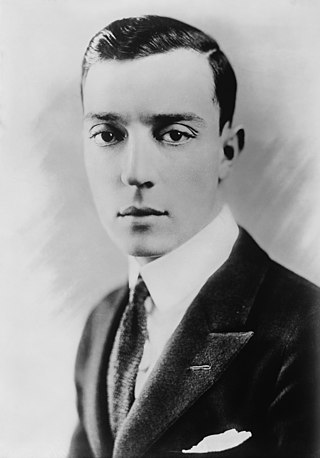
Joseph Frank "Buster" Keaton was an American actor, comedian and director. He is best known for his silent film work, in which his trademark was physical comedy accompanied by a stoic, deadpan expression that earned him the nickname "The Great Stone Face".
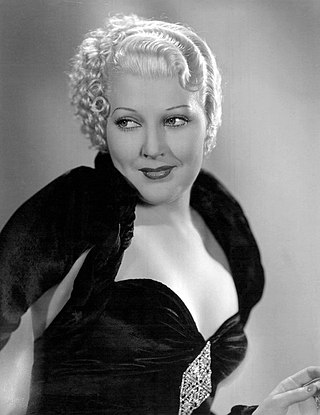
Thelma Alice Todd was an American actress and businesswoman who carried the nicknames "The Ice Cream Blonde" and "Hot Toddy". Appearing in about 120 feature films and shorts between 1926 and 1935, she is remembered for her comedic roles opposite ZaSu Pitts, and in films such as Marx Brothers' Monkey Business and Horse Feathers and a number of Charley Chase's short comedies. She co-starred with Buster Keaton and Jimmy Durante in Speak Easily. She also had roles in several Wheeler and Woolsey and Laurel and Hardy films, the last of which featured her in a part that was cut short by her sudden death in 1935 at the age of 29.

Limelight is a 1952 American comedy-drama film written, produced, directed by, and starring Charlie Chaplin, based on a novella by Chaplin titled Footlights. The score was composed by Chaplin and arranged by Ray Rasch.

"Once Upon a Time" is episode 78 of the American television anthology series The Twilight Zone. It originally aired on December 15, 1961. It features early film star Buster Keaton in one of his later roles, as an unlikely time traveler, and the opening and closing scenes pay tribute to the silent films for which he was famous.
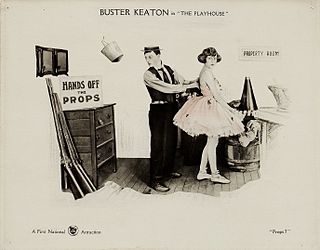
The Playhouse is a 1921 American two-reel silent comedy film written by, directed by, and starring "Buster" Keaton. It runs for 22 minutes, and is most famous for an opening sequence where Keaton plays every role.

One Week is a 1920 American two-reel silent comedy film starring Buster Keaton, the first independent film production he released on his own. The film was written and directed by Keaton and Edward F. Cline, and runs for 19 minutes. Sybil Seely co-stars. The film contains a large number of innovative visual gags largely pertaining to either the house or to ladders.
Clyde Adolf Bruckman was an American writer and director of comedy films during the late silent era as well as the early sound era of cinema. Bruckman collaborated with such comedians as Buster Keaton, Monty Banks, W. C. Fields, Laurel and Hardy, The Three Stooges, Abbott and Costello, and Harold Lloyd.

I Dood It is a 1943 American musical-comedy film starring Red Skelton and Eleanor Powell, directed by Vincente Minnelli, and released by Metro-Goldwyn-Mayer. The screenplay is by Fred Saidy and Sig Herzig and the film features Richard Ainley, Patricia Dane, Lena Horne, and Hazel Scott. John Hodiak plays a villain in this production, just his third movie role. Jimmy Dorsey and his Orchestra provide musical interludes.
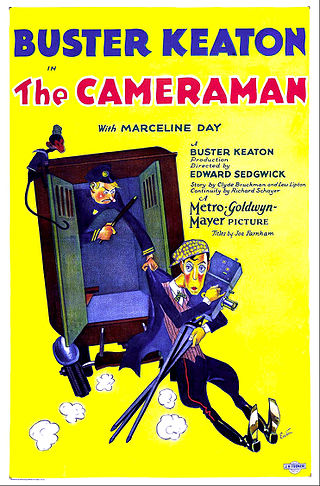
The Cameraman is a 1928 American silent romantic comedy film directed by Edward Sedgwick and an uncredited Buster Keaton. The picture stars Keaton and Marceline Day.

The Cook is a 1918 American two-reel silent comedy film written by, directed by, and starring Roscoe "Fatty" Arbuckle and featuring Buster Keaton and Al St. John. The movie is a slapstick comedy and focuses on goings-on at a high-end restaurant with Arbuckle as the Cook and Keaton as the Waiter.

Back Stage is a 1919 American two-reel silent comedy film directed by and starring Roscoe "Fatty" Arbuckle and featuring Buster Keaton and Al St. John.

Monte Collins was an American film actor and screenwriter. He appeared in more than 160 films between 1920 and 1948. He also wrote for 32 films between 1930 and 1951.

The Boat is a 1921 American two-reel silent comedy film written and directed by, and starring Buster Keaton. Contemporary reviews consider it one of his best shorts, with One Week (1920), The Playhouse (1921) and Cops (1922). It is presently in the public domain. The International Buster Keaton Society takes its name, The Damfinos, from the name of the film's boat.

The Frozen North is a 1922 American short comedy film directed by and starring Buster Keaton. The film is a parody of early western films, especially those of William S. Hart. The film was written by Keaton and Edward F. Cline. The film runs for around 17 minutes. Sybil Seely and Bonnie Hill co-star in the film.

Allez Oop is a 1934 American short comedy film starring Buster Keaton. It was the second film Keaton made for Educational Pictures.
Grand Slam Opera is a 1936 American short comedy film starring Buster Keaton and produced by Educational Pictures.
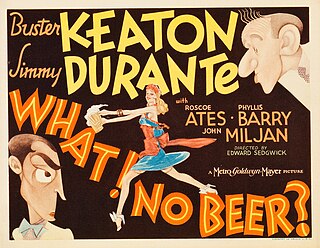
What - No Beer? is a 1933 Pre-Code comedy film released by Metro-Goldwyn-Mayer directed by Edward Sedgwick and starring Buster Keaton and Jimmy Durante. MGM had also paired Keaton and Durante as a comedy team during this period in The Passionate Plumber and Speak Easily.
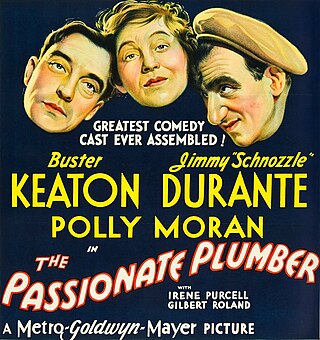
The Passionate Plumber is a 1932 American pre-Code comedy film directed by Edward Sedgwick, and starring Buster Keaton, Jimmy Durante, and Irene Purcell. The screenplay by Laurence E. Johnson and Ralph Spence is based on the 1926 play Dans sa candeur naïve by Jacques Deval. It is the second screen adaptation of the play, following the 1928 silent film The Cardboard Lover. It later was remade in 1942 as Her Cardboard Lover.
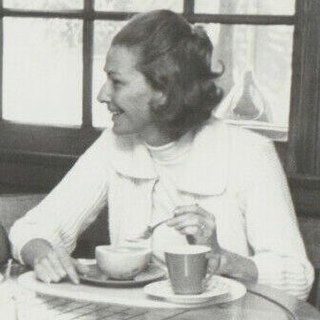
Eleanor Ruth Keaton was an American dancer and variety show performer. She was an MGM contract dancer in her teens and became the third wife of silent-film comedian Buster Keaton at the age of 21. She is credited with rehabilitating her husband's life and career. The two performed at the Cirque Medrano in Paris and on European tours in the 1950s; she also performed with him on The Buster Keaton Show in the early 1950s. After his death in 1966, she helped ensure Keaton's legacy by giving many interviews to biographers, film historians, and journalists, sharing details from his personal life and career, and also attended film festivals and celebrations honoring Keaton. In her later years, she bred champion St. Bernard dogs, was a gag consultant for Hollywood filmmakers, and was an invited speaker at silent-film screenings.
The Buster Keaton Show was a television series broadcast in 1950 starring Buster Keaton. It was broadcast over KTTV, which at the time was the Los Angeles affiliate of CBS.

















